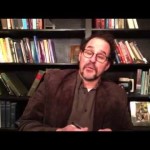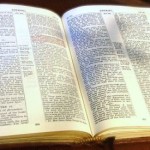We run our website the way we wished the whole internet worked: we provide high quality original content with no ads. We are funded solely by your direct support. Please consider supporting this project.
What is the significance of Deuteronomy 30:19?
After establishing the terms of the covenant he was entering into with Israel, the Lord says, “I call heaven and earth to witness against you today that I have set before you life and death, blessings and curses. Choose life so that you and your descendants may live.”
This passage represents the most fundamental motif of the whole Bible: namely, the Lord seeks to enter into a covenantal relationship with people. He lays before them the terms of the covenant, spells out the consequences of keeping and breaking the covenant, and then lets them choose whether to enter into a covenantal relationship with him. He desires Israel, and ultimately all people (1 Tim. 2:4; 2 Pet. 3:9), to “choose life.” But precisely because a covenant of love must be chosen rather than coerced, he also gives people the power to choose to reject his love.
World history functions as a probationary period to determine who will and will not enter into an eternal covenantal relationship of love with the Lord. In the end, there will only be those who say “yes” to God’s invitation and therefore participate in his eternal triune love (heaven), and those who say “no” and thereby choose to eternally separate themselves from the Lord (hell).
In passages such as this one, the point of giving people the choice to either accept or reject the terms of the covenant is to determine whether or not they will participate in the covenant (e.g. Deut. 8:2; Judg. 3:4; 2 Chron. 32:31). But if the outcome of the probation is already foreknown an eternity before he ever creates or calls anyone, there is really no point to the probation. Moreover, since the Lord explicitly tells us he wants all people to “choose life,” there is no explanation as to why he would create people whom he was certain would “choose death.”
If we allow that the future is partly open and known by God as such, and if we concede that to some extent it lies in the power of free agents to decide which possibilities will and will not be actualized, then the purpose for every probation the Lord puts us through becomes clear. Love must be chosen; the outcome of free choices does not exist until the free choice is made; hence the Lord is finding out who will and will not choose love.
Category: Q&A
Tags: Open Theism, Q&A
Topics: Open Theism
Verse: Deuteronomy 30
Related Reading

The Incarnation: More Than a Rescue Mission
A mistake people often make concerning the Incarnation is that they fail to distinguish the eternal plan of God to unite himself with humanity in Christ, on the one hand, from the atoning significance this plan acquired after the fall, on the other. Some therefore think of the Incarnation as a sort of “Plan B”…

Free Will: What about “natural” evil? Was Hurricane Sandy a Free Agent?
What about natural evil? How does free will help to make sense of this? Greg reflects on the origins of sickness, natural disaster, animal suffering and so on. Hope you’re enjoying the series so far. There’s more to come!

What is the significance of Genesis 6:5–6?
Seeing the wickedness of the whole human race which preceded the great flood, the Bible says, “The Lord was sorry that he made humankind on the earth, and it grieved him to his heart.” If everything about world history was exhaustively settled and known by God as such before he created the world, God had…

How do you respond to Ephesians 1:11?
“In Christ we have obtained an inheritance, having…been destined according to the purpose of him who accomplishes all things according to his counsel and will.” This text has frequently been used to support the view that all things happen in accordance with God’s counsel and will. But this reads too much into the text. This…

What is the significance of Isaiah 38:1–5?
God tells Hezekiah “you shall die: you shall not recover” (vs. 1). Hezekiah pleads with God and God decides to “add fifteen years” to his life. As we noted concerning 2 Kings 20:1–5, if God foreknew that he wasn’t going to end Hezekiah’s life, his declaration that he intended to do so and his decision…

Answering an Objection to a Cross-Centered Approach to Scripture
Through Greg’s Facebook and Twitter, we’ve been getting some great feedback and questions regarding his cross-centered approach to Scripture. Several have voiced questions similar to the reader’s (below), so we thought it would be helpful to post Greg’s answer here on his blog.
